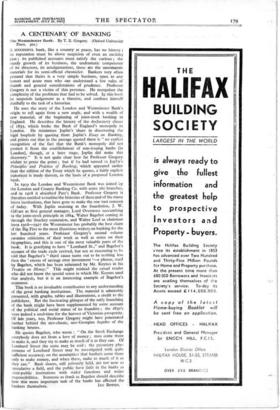A CENTENARY OF BANKING A SUCCESSFUL bank, like a country
at peace, has no history ; its reputation must be above suspicion of even an exciting past ; its published accounts must satisfy the curious ; the steady growth of its business, the undramatic competence of its directors, its amalgamations, these are the unromantic materials for its semi-official chronicler. Bankers very often pretend that theirs is a very simple business, open to any honest and acute man who can understand a. few rules of thumb and general considerations of prudence. Professor Gregory is not a victim of this pretence. He recognises the complexity of the problenis that had to be solved. In this book he suipends judgement as a theorist, and confines himself dutifully to the task of a historian.
He uses -the story of the London and Westminster Bank's origin, to tell' again from a new angle, and with a wealth of new material, of the beginning of joint-stock banking in England. He describes the history of the declaratory clause o 1833, which broke the Bank of England's monopoly in London.' He minimises joplin's "Share in discovering the legal loophole by quoting from Joplin's Essay on Banking, and paints out that in the passage quoted there is " no explicit recognition of the faCt that the Bank's monopoly did- not protect if from the establislunent of non-issuing banks [in London], thOugh; at a later stage, Joplin did make this discovery." It is not quite clear how far Professor Gregory wisheS to press the point ; but if Ife hid turned to JopHn's Principles and Practice of Banking, 'which appeared earlier than the edition of the Essay which he quotes, a fairly explicit statement is `made therein as the basis of a proposed London bank. ' , In 1909 the London and Westminster Bank was joined by the London and County Banking Co. with some 26o branches, and in 1918 it abierbed Pair's Bank. Professor Gregory is therefore entitled tOiiutlinahe hisidries of these and of the many lesser institutions, that have gone to make the one vast 'concern of today. With Joplin assisting at the • foundation, J. W. Giftart as first general manager, Lord Overstone succumbing to the joint-stock principle in 1864, Walter Bagehot coming in through the Stuckey connexion, and Walter Leaf as chairman front 1918-1927 the Westminster has probably the best claim of the Big Five to the most illustrious writers on banking for the last hundred years. Professor Gregory's second volume contains criticisms, of their work as well as notes on their biographies, and this is one of the most Valuable parts of the book. , It is gratifying to have " Lombard St.," and Bagehot's account of the trade cycle revived, but not so reassuring to be told that Bagehot's " third cause turns out to be nothing less than the ' excess of savings over investment '—a phrase, used by Bagehot, which has been reiterated by Mr. Keynes in his Treatise on Money." This might mislead the casual reader who "did not know the special sense in which Mr. Keynes used that analysis, but it is an interesting example _ of Bagehot's acuteness.
This. book is an invaluable contribution to any understanding of the great banking institutions. The material is admirably presented, with graphs, tables and illustrations, a credit to the pnblishers. But the fascinating glimpse of the early launching of the bank might have been supplemented by some account of the political and social status. of its founders ; the 183o's Were indeed a seed-time for the harvest of Victorian prosperity. Of, late sears, too, Professor Gregory_ might have penetrated further behind the neo-claisic; neo-Georgian facades of the banking henses. He quotes Bagehot, who wrote " On the Stock Exchan. ge everybody does act from a love of money ; men come there to make it, and they try to make as much. of it as they can. Of Lombard Street the ,same may, be said ; the pecuniary phe- nomena of Lombard Street may be investigated with quite sufficient accuracy, on the assumption that bankers come there only to make money, and when there, make as much of it as they can." Bank shares, still privately held, are not -now so speculative a field, and the public have faith in the banks as semi-public institutions with wider fUnctions and wider responsibilities, Soineone as frank as Bagehot should describe how this more important task of the banks has affected the






























































 Previous page
Previous page